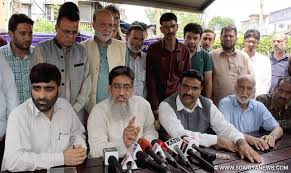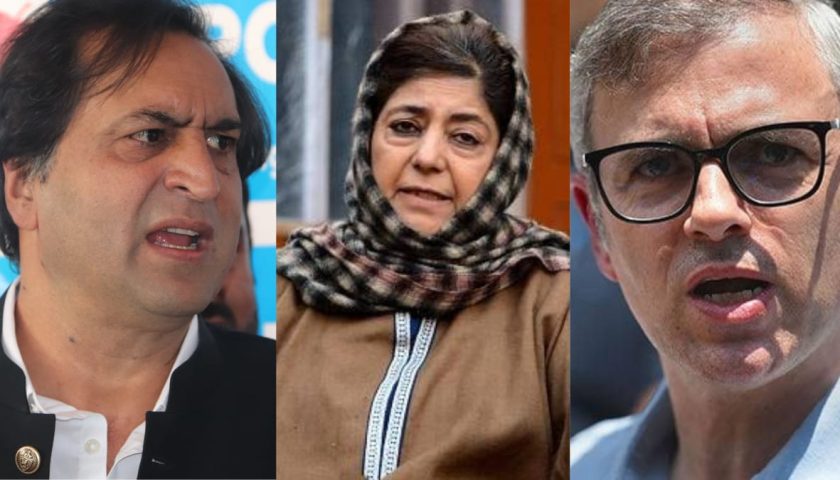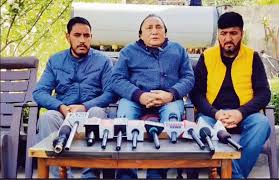Upping the ante against Goods and Service Tax (GST) law, all Kashmir-based trade bodies and a civil society formations on Sunday came together to form the “Kashmir Coordination Committee” to resist implementation of the new tax regime in the state.
The decision followed a series of meeting between trade and business bodies and civil society groups to pressurize the government to come up with its own law on the GST, said former president Federation Chambers of Industries Kashmir, Shakeel Qalander.
He said around 30 trade bodies and civil society groups are part of the umbrella organization KCC that would be announcing its program at a press conference on Monday.
The Valley-based traders and opposition parties including National Conference are at the forefront of opposing the GST which aims at economic integration of the states with union of India.
They have been opposing the extension of 101st Amendment Act of the Constitution of India to J&K that would bring the state within the ambit of the GST, arguing the move would force the state to surrender the powers to collect taxes to New Delhi.
“We reject the central law and we will in unison oppose its implementation to J&K,” said Qalander.
A senior member of Kashmir Economic Alliance, which is now part of the KCC, said the committee would ask the government to come up with its own GST model that will take care of state’s autonomy and its economy.
“The law shall not infringe upon our state’s special position neither strangulate our economy,” he said.
Though the state government has repeatedly said it would ensure protection of the state’s fiscal autonomy as well as Article 370 while allowing implementation of GST to the state, it hasn’t however explained the mechanism by which it intends to safeguard the states special position.
“We are mulling to bring all other association and organization under the KCC to make it a movement against implementation of GST in its present form to J&K,” said Qalander.
Having missed the July 1 deadline for implementation of GST to J&K owing to lack of consensus and strong opposition to the central law, the government has now convened Assembly session from July 4 to discuss its implementation.
JK Can Bring Its Own GST LAW: Rather
J&K government is “constitutionally competent” to bring its own law on Goods and Service Tax (GST), said National Conference senior leader Abdur Rahim Rather on Sunday, reiterating that the implementation of the new tax regime in its present form will have “far-reaching consequences” on Article 370 and the state’s fiscal autonomy.
“Our position is that till we get constitutional, administrative and economic safeguards, National Conference will not accept the GST. The government should not do it (implement GST in its present form). But if they still do it, they will have to face the consequences,” Rather said.
The state government is finding itself in a tight-spot as the Opposition and trade bodies have opposed the GST, saying it would result in handing over of state’s powers to collect taxes to the government of India and erosion of state’s special position. At the center of the controversy is the 101st Constitutional Amendment Act that aims at the economic integration of the states with the Union of India and empowers New Delhi to wrest control over collection of taxes on goods and services in the states.
Rather, who is a former finance minister and also headed the empowered committee on GST, however, argued that the state has powers to bring its own taxation law with features similar to the GST.
“It is possible. We are not saying that we will secede. The concessions that we are asking for can be worked out within the constitution of India which has given us special position and powers. We are not asking anything outside the constitution,” said Rather, who was flanked by party’s chief spokesman Junaid Azim Mattu.
Senior PDP leader Muzaffar Hussain Baig had said that it was impossible for the state to bring its own GST, saying it would lead to constitutional crisis as the government of India would require amending at least two of the Articles in the Constitution of India and the State would require to amend Section 5 of J&K Constitution that empowers it to impose taxes unlike other states which draw the power from the Indian constitution.
Rather said the “proposal” that the previous NC-Congress government had worked out on the GST doesn’t require amending J&K Constitution. “It (the state’s own GST) is constitutionally possible,” said the NC leader.
Reading out from a document, the NC leader said under the proposal, the state has to lay down a mechanism for quantifying the components of C-GST and I-GST which it shall collect for and on behalf of union of India and pass on such component to the union of India after deduction of collection charges as envisaged by the state legislature.
“Such a mechanism would be in conformity to the constitutional position enjoyed by J&K to ensure participation of state in the proposed GST regime,” said Rather.
He reminded the government of its October 14, 2016 cabinet decision in which the PDP-BJP had, according to him, empowered the Finance department to formulate and discuss with New Delhi and GST Council the modalities of extending the law to the state while keeping in view that J&K’s special constitutional power to tax remains intact. The cabinet had then also decided to frame its own legislation in consultation with the Law department, Union Finance ministry and legal experts, he said.
“What have they done since then? Did they talk to anybody or consult the union finance ministry or legal experts…they haven’t done anything till date,” Rather hit out at the government.
While the state government has been reiterating that it would ensure all constitutional safeguards while allowing extension of the 101st Amendment Act to the state that would allow GST application, it has however failed to explain how it would do so. Several government initiatives like including an all-party meeting, setting up a consultative group and convening special session of the Assembly have failed to build any political consensus on the matter.
As a last effort, the government has now re-convened the Assembly again from July 4 to try and build a consensus on the issue. But National Conference today questioned the move, saying that the Finance minister Haseeb Drabu has told the media that the government was likely to implement the GST from July 6. “What for are they holding the Assembly session now when they have already decided to implement the GST from July 6?” Rather asked.
Rebutting the assertion that the GST wont impact state’s special position, Rather said under the regime New Delhi would be empowered to collect the sales tax though C-GST, which was otherwise within the domain of J&K government.
“It will mean the surrender of exclusive powers enjoyed by J&K to the center,” said Rather.
He said as chairman of the empowered committee on GST he had time and again reiterated that “we can’t afford to tamper with the special status enjoyed by a sensitive political state like J&K and anything that isn’t agreeable to the state shall not be accepted.”
According to him when Drabu became the member of the GST empowered committee, he had, in June 4, 2015 meeting of the committee, said that the PDP-BJP government would go by the stand taken by him (Rather) on the GST.
“My stand was that we should have our own law. Today he (Drabu) is saying that it isn’t possible. Then what is possible…they are not even talking about that as well,” said Rather.
To a question, Rather said if government of India has to listen to BJP only which is talking about implementation of the GST in J&K in present form, then, he said it was “unfortunate”. “We are Indian like them. We have to find a solution,” said Rather, adding that his party wasn’t against implementation of GST but wants adequate safeguards.
To a question whether the NC would participate in the upcoming Assembly session, Rather said the party would soon take the final call on it.
Earlier, Mattu hit out at the government for not even trying to take up with New Delhi the matter about constitutional safeguards.





